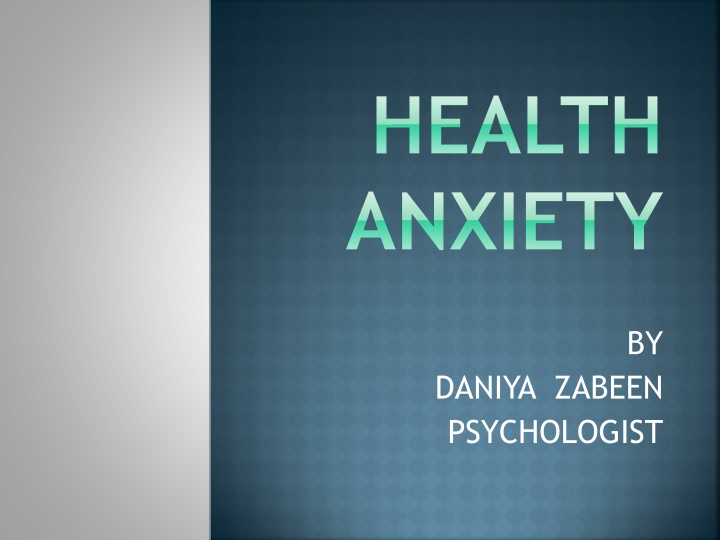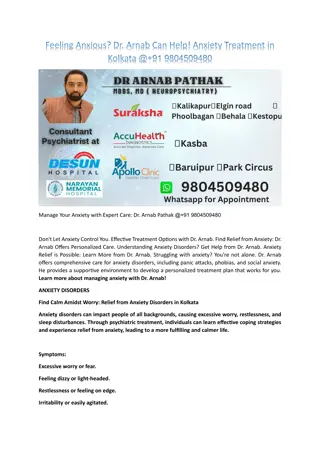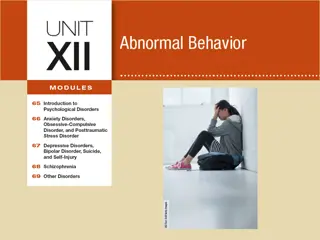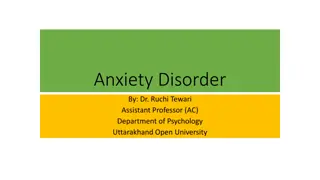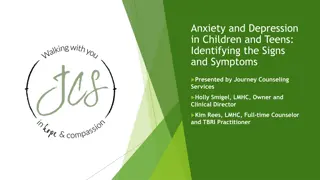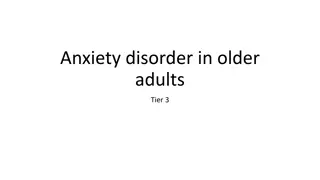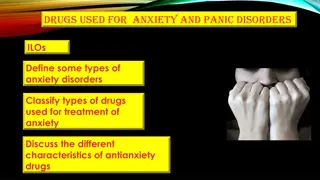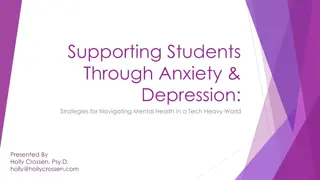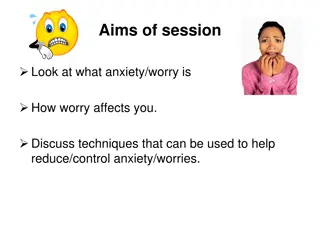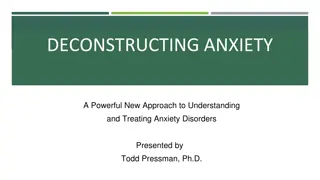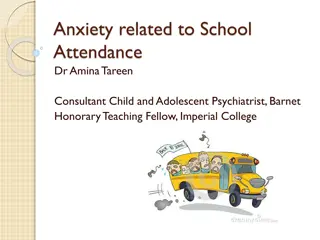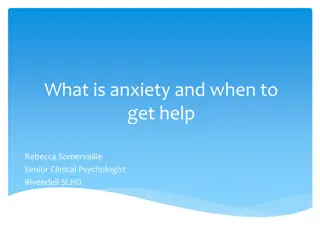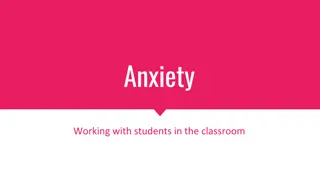Health Anxiety: Causes, Symptoms, and Impacts
Health anxiety, also known as illness anxiety or hypochondria, is characterized by obsessive worry about having a serious medical condition. Individuals with health anxiety misinterpret minor body sensations as symptoms of a severe illness, despite reassurance from medical professionals. This condition can significantly impact daily life when the worrying becomes excessive and irrational. Common thoughts include fearing cancer or believing that symptoms are indicative of a life-threatening illness. Recognizing the signs and understanding how anxiety affects feelings, thoughts, body functions, and behaviors is crucial in addressing health anxiety effectively.
Download Presentation

Please find below an Image/Link to download the presentation.
The content on the website is provided AS IS for your information and personal use only. It may not be sold, licensed, or shared on other websites without obtaining consent from the author.If you encounter any issues during the download, it is possible that the publisher has removed the file from their server.
You are allowed to download the files provided on this website for personal or commercial use, subject to the condition that they are used lawfully. All files are the property of their respective owners.
The content on the website is provided AS IS for your information and personal use only. It may not be sold, licensed, or shared on other websites without obtaining consent from the author.
E N D
Presentation Transcript
HEALTH ANXIETY BY DANIYA ZABEEN PSYCHOLOGIST
WHAT IS HEALTH ANXIETY? Health anxiety is an obsessive and irrational worry about having a serious medical condition. It is also called illness anxiety, and was formerly called hypochondria. This condition is marked by a person's imagination of physical symptoms of illness.
WHAT IS HEALTH ANXIETY? The person misinterprets his minor or normal body sensations as serious disease symptoms despite reassurance by medical professionals that they don t have an illness. E.g; thoughts of a person, I often have worrying symptoms that must be the sign of something serious. Doctors have found nothing yet. I make sure I rest a lot, so I don t strain myself. I don t travel away form my own town, I want to be near our own doctors. I feel, I must keep checking how I am everyday .
WHEN DOES WORRYING ABOUT HEALTH BECOMES A PROBLEM? Health worries become a problem when they begin to get in the way of normal life even though there is no reason to think that anything is seriously wrong.
AM I SUFFERING FROM HEALTH ANXIETY? Anxiety of any sort can affect us in at least four different ways. It affects: The way we feel The way we think The way our body works The way we behave
HOW WE FEEL? Anxious , nervous, worried, frightened. A feeling of dread. Tensed, stressed, on edge, unsettled. Unreal, ,strange, woozy. Detached, panicky. Feeling tired or unwell.
HOW WE THINK? Constant worrying about health. Imagining the worst an dwelling on it. Thoughts abut illnesses and symptoms. Concentrating on parts and symptoms. Thinking that the doctor can only help. Worrying that the doctor may have missed something. Belief that unless keep an eye on things one may miss signs of a serious illness. Thinking that the family/friends will only know if the symptoms are seen. Thinking that the doctor will not take me seriously.
SOME COMMON THOUGHTS This must be cancer. I am unwell. A headache like this can not be just out of stress. I may die if I don t do anything. Doctors often miss several things.
WHAT HAPPENS TO BODY Odd sensations in various parts of body. Body aching Breathing changes. Chest feels tight or painful. Dizziness. Restlessness. Having to go to the toilet frequently. Headache. Increase in heartbeats. Stomach contractions. Sweating. Tense muscles Tingling or numbness in toes and fingers or arms.
WHAT WE DO? Frequent visit to physicians. Ask family/friends for reassurance about symptoms. Frequently checking body for symptoms such as lumps, bumps or pain. Focuses on one area or part of the body for changing sensations. Seek information on serious illnesses and check for those symptoms in book, on TV or Internet. Avoid travel from own town to different places.
TREATMENT Treatment for health anxiety focuses on improving the symptoms and ability to function in daily life. Typically, treatment involves psychotherapy, with medications sometimes added. Psychotherapy, particularly Cognitive Behavioral Therapy (CBT).
BENEFITS OF CBT Helping the person identifying the health anxiety worries and beliefs. Making them learning other ways to look at their bodily sensations by changing unhelpful thoughts. Raising their awareness of how their worries affect the person and his behavior. Helping them learn responding to their body sensations and symptoms differently. Makes them learn to better cope with their anxiety and stress. Making them learn to stop avoiding situations and activities because of physical sensations. Helping them learn in how to avoid examining their body for signs of illness and repeatedly looking for reassurance that they are healthy.
BENEFITS OF CBT Boosting your functioning at home, work, or school, in social settings, and in relationships with others. Checking whether or not you re suffering from other mental health disorders, like depression or bipolar disorder.
OTHER TREATMENTS Other forms of psychotherapy are also sometimes used to treat health anxiety. This may include behavioral stress management and exposure therapy. Medication: If the symptoms are severe, the doctor may recommend medication in addition to other treatments. Antidepressants, such as selective serotonin reuptake inhibitors (SSRIs), are frequently used for this condition.
